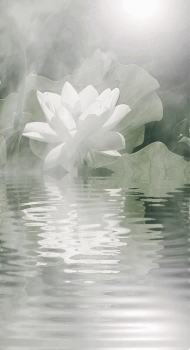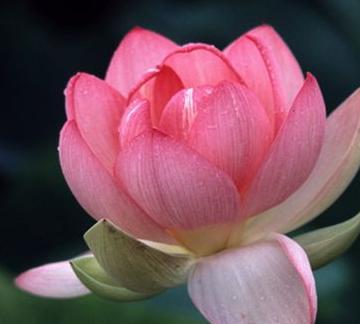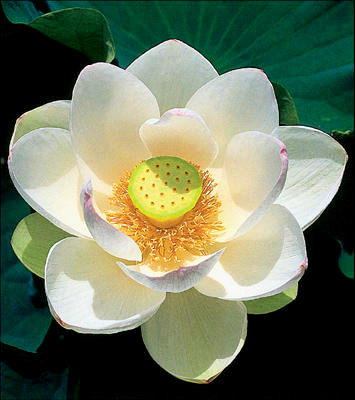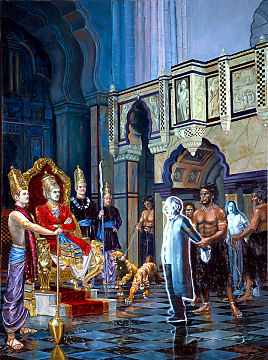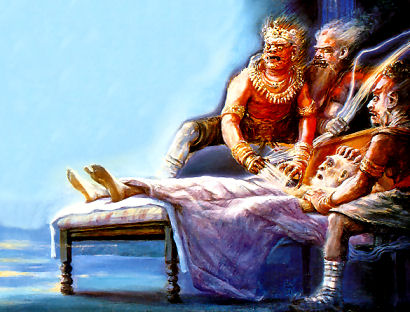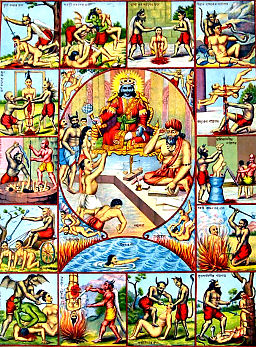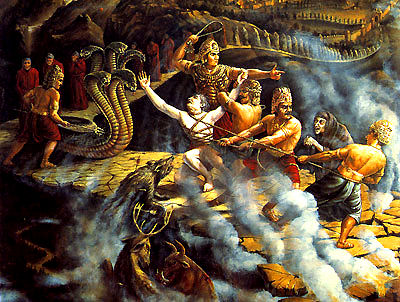
road leading to hell - way to Yamas abode
THE ROAD TO HELL - the way to Yamas abode
Hell is known, in the Western world, as the world of the dead, or the abode of Satan and the forces of evil, where sinners suffer punishment for their sins.
According to the Vedas und Puranas there existing hellish planets, where sinful living entities are taken, after the death of their gross physical bodies.
According to the information given in the Vedas, the sinner or rather the subtle or ethereal body of the sinner consisting of mind, intelligence and false ego, is brought to the court of Yamaraja, for judgment of his righteous and sinful activities and afterwards is taken either to heavenly or hellish planets, to suffer or enjoy his karma.
Hell is made of subtle or ethereal energy. It is a subtle part of this material universe, which is invisible to the ordinary human eye, just like the mind, or ghosts are, for instance. The Bhagavat Purana gives an account of 28 hells called Naraka’s.
If a person is impious and quite sinful, the messengers of Yamaraja, called the Yamadutas, fierce, horrible looking persons with twisted features, copper red flaming hairs that stand on end, black in complexion and frightening to behold, appear at the deathbed of the person in question and drag him forcibly from his body with ropes and chains. This scene so frightens the person that he literally dies of fright. They then bind up the subtle body of the person with a rope, where they take the soul, now covered only by the subtle body of mind, intelligence and false ego, to the abode of Yamaraja for judgement. He is taken over long stretches of hot, dry sands, and along the way he is insulted in various ways by other horrible creatures and bitten by dogs. He is suffering terribly on this journey and he wishes it would end.
However, when it does end he is taken before Yamaraja, the fierce demigod in charge of death and punishing the sinful. He is forced to accept a position of suffering according to his sins in hell(s) which exist at the bottom of the universe, just above the Garbhodaka Ocean. In this hellish region called the Naraka, there are approximately 28 hellish places. He gets an subtle airy, unbreakable body based on his specific karma (Garuda Purana 2.18.40) to suffer in.
The hellish planets are ruled by Yamaraja (god of death), who is the son of the sun-god. He resides in Pitrloka with his personal assistants, performing his duty according to the rules and regulations laid down by the Supreme Lord. At the time of death, when the heart stops beating, the living entity, namely the soul, along with the subtle material body consisting of mind, intelligence and false ego, is dragged out by the subtle creatures, the Yamadutas, from his gross material body consisting of earth, water, fire, air and ether.
The subtle, or ethereal body of the soul, is reflected by the gross body, and thus the subtle and the gross bodies of the person are similar even at the time of leaving the gross material body. In other words, the subtle body is a reflection of the gross body and its activities.
While in the material world, if a person commits many sins, the subtle body will look very sinful, and the person will be forced to go to different hells, near the bottom of the universe. When the Yamadutas drag the soul and his impure, subtle body, out of the temporary gross body, onto the road to hell, the suffering already begins, depending on the degree of committed sins.
The Yamadutas are the servants of Yamaraja, they bring the sinful persons before Him for judgment. As the King of the pitras or ancestors, Yamaraja is a very powerful son of the sun-god, who resides in Pitrloka with his personal assistants, performing his duty according to the rules and regulations laid down by the Supreme Lord. Yama means subduing or controlling the senses and raja means king. He is the superintendent of death, and is also called Dharmaraja, the King of dharma or religion. He punishes or rewards everybody according to their acquired karma.
"At the time of death Ajāmila saw three awkward persons with deformed bodily features, fierce, twisted faces, and hair standing erect on their bodies. With ropes in their hands, they had come to take him away to the abode of Yamarāja. When he saw them he was extremely bewildered, and because of attachment to his child, who was playing a short distance away, Ajāmila began to call him loudly by his name [Nārāyaṇa]. Thus with tears in his eyes he somehow or other chanted the holy name of Lord Nārāyaṇa." (Srimad-Bhagavatam 6.1.28-29)
The Yamadūtas said: "This man Ajāmila did not undergo atonement. Therefore because of his sinful life, we must take him into the presence of Yamarāja for punishment. There, according to the extent of his sinful acts, he will be punished and thus purified." (Srimad-Bhagavatam 6.1.68)
The persons who gave in to sinful activities are within Yamaraja`s jurisdiction and are brought before him dressed in chains. Yamaraja properly judges them according to their specific sinful activities and sends them to one of the many hellish planets for suitable punishment. According to one's sinful activities, one will go to different hellish planets, each planet providing the means for punishing a particular sin committed. The allotted time one has to spend there, enduring the particular punishment, is also determined by Yamaraja, according to the severity of the sin one has committed.
In the Srimad Bhagavatam (5.26.6) Srila Prabhuada describes: "One should not think Yamaraja is a fictitious or mythological character; he has his own abode, Pitrloka, of which he is the king. Agnostics and Atheists may not believe in hell, but Sukadeva Gosvami affirms the existence of the Naraka planets, which lie between the Garbhodaka Ocean and Patalaloka. Yamaraja is appointed by the Supreme Personality of Godhead to see that the human beings who violate His rules and regulations get punished accordingly, so that they will not repeat the mistake and do not violate His rules and regulations again."
An account of the way leading to the court of Yamaraja
Introduction:
The sinner passes that path which leads to Yamaloka (which is 86,000 yojanas long (about 1,100,000 km)) within ten muhurtas or 8 hours. (1 muhurta is 48 minutes) (10x48: 480: 8 hours). The different paths to hell with their particular punishment are in accordance with the gravity of their sins.
The two different paths to hell:
The path of sin leads to the hellish planets situated below the earth, below the South Pole. Up and Down in the universe is in reference to the orbit of the sun; the 14 planetary systems are parallel to this plane.
Also below the Earth level, but just above the region of Naraka are the subterranean heavenly planets (or bila-svarga); generally these planets are inhabited by subtle beings, i.e. beings that most persons cannot see, because of their gross, undeveloped senses. These subterranean heavenly planets should not be confused with the genuine heavenly planets, like the sun and the moon. For more information about the subterranean heavenly planets, see the Srimad Bhagavatam, 5th canto, chapter 24, text 8.
The path of sin is described as follows:
Four Yamadutas, terrible in form, take the sinner, on the papa marga - the path of sin. Beating the subtle body with hammers, they bind the sinner with leather straps and iron chains. Sometimes the Yamadutas personally kill the material body, e.g. one time a Yamaduta took the form of a serpent and bit the sinner, who then died.
The path of piety is described as follows:
Four Yamadutas with gentle form take the pious soul on the dharma marga - the path of religion. This path has pleasant lakes, pleasant breezes, heavenly gardens, nectarine foods and drinks and comfortable vimanas or celestial airplanes or chariots. People who are taken on this path will meet a different-looking Yamaraja, one of the twelve mahajanas, dressed as a Vaisnava King who judges them and sends them to the planets that they deserve; this can even be the spiritual planets.
Sometimes the living entity is not taken by the Yamadutas on either path. E.g. Padma Purana 5.109 describes that once hundred Yamadutas came to get a sinner, but because the person had worshiped and embraced the Siva murti at the time of death, the Sivadutas also came… The Yamadutas had failed to respect the fact that the person, at the most important time of his life, the time of death, had embraced the murti of Lord Siva. The Sivadutas, in accordance with religious principles, stopped all of the Yamadutas by force; after which they took the devotee of Siva to Sivaloka where he became a servant of his worshipable Master.
The path to the abode of Yama
1. Garuda said: What is the path of misery in the world of Yama like? Tell me, O Keśava, in what, way the sinful go there.
2. The Blessed Lord said: I will tell you about the Way of Yama, bestowing great misery. Although you are my devotee, when you have heard it you will become agitated.
3. There is no shade of trees there, in which a man may take rest, and on this road there is none of the foods by which he may support life.
4. No water is to be seen anywhere that he, extremely thirsty, may drink. Twelve suns blaze, O Bird, as though at the end of a Pralaya.
5. There the sinful soul goes along pierced by cold winds, in one place torn by thorns, in another stung by very venomous serpents.
6. The sinful in one place is bitten by ferocious lions, tigers, and dogs; in another stung by scorpions; in another burnt by fire.
7-8. In one place there is a very terrible forest of sword-like leaves, which is recorded as two thousand Yojanas in length and breadth. Infested with crows, owls, hawks, vultures, bees, mosquitoes, and having forest-fires,--by whose leaves he is pierced and torn.
9. In one place he falls into a hidden well; in another from a lofty mountain;
in another he treads on razor-edges and on spear-points.
10. In one place he stumbles in the awful black darkness and falls into
water; in another in mud abounding in leeches; in another in hot slime.
11. In one place is a plain of hot sand, made of smelted, copper; in another a mound of embers; in another a great cloud of smoke.
12-13. In some places are showers of charcoal, showers of stones and thunderbolts, showers of blood, showers of weapons, showers of boiling water. And showers of caustic mud. In one place are deep chasms; in others bills to climb and valleys to descend.
14. In one place there is pitch darkness; in another rocks difficult to climb over; in others lakes filled with pus and blood, and with excrement.
17. In the midst of the way flows the terribly horrible Vaitaran? River, which when seen inspires misery, of which even an account arouses fear. Extending a hundred Yojanas, a flow of pus and blood, impassible, with heaps of bones on the banks, with mud of flesh and blood, Unfordable, impassible for the sinful, obstructed with hairy moss, filled with huge crocodiles, and crowded with hundreds of dreadful birds.
18-20. When it sees the sinful approaching, this river, overspread with flames and smoke, seethes, O Tārkshya, like butter in the frying-pan: Covered all over with dreadful throngs of insects with piercing stings, infested with huge vultures and crows with adamantine beaks. Filled with porpoises, with crocodiles, with leeches, fishes and turtles, and with other flesh-eating water-animals.
21. Very sinful people, fallen into the flood, cry, O Brother, 0 Son, O Father!'--again and again wailing.
22-23. Hungry and thirsty the sinful drink the blood, it is said. That river, flowing with blood, carrying much foam, Very dreadful, with powerful roaring, difficult to see into, fear-inspiring,--at the very sight of it the sinful swoon away.
24. Covered with many scorpions, and with black snakes,--of those who have fallen into the midst of this, there is no rescuer whatever.
25. By hundreds of thousands of whirlpools the sinful descend to the lower region. They stay for a moment in the lower region, after the moment rising again.
26. 0 Bird, this river was created only that the sinful should fall into it. It is difficult to cross and gives great misery, and its opposite cannot be seen.
27. Thus along the Way of Yama, of many kinds of pain, giving extreme misery, go the sinful, crying and weeping and laden with misery.
28. Bound by the noose, some of them being dragged by hooks, and pierced from behind with points of weapons, the sinful are led on.
29. Others are drawn along by a noose through the end of the nose, and also by nooses through the ears; others, by the nooses of death being dragged along, are pecked by crows.
30-32. Some go on the way neck, arms, feet and back bound with chains, bearing many loads of iron, And being beaten with hammers by the awful messengers of Yama; vomiting blood from the mouth, which then they eat again, Bewailing their own karmas these beings, becoming exhausted, full of very great misery, go on towards the mansion of Yama.
33-34. And the stupid, thus going on the way, calling on son and grandson, incessantly crying out, 'Oh, oh,' repents:-- 'By great meritorious effort birth as a human being is gained. Having obtained that, I did not do my duty,--also, whatever have I done!
39. 'I made no gifts; no offerings to the fire; performed no penances; did not worship the deities; did not perform service at a place of pilgrimage as prescribed;—0 Dweller in the Body, make reparation for whatever you have done!
40. 'I did not duly honour the assemblies of Brahmins; did not visit the holy river 1; did not wait upon good men; never performed any benevolent acts;--0 Dweller in the Body, make reparation for whatever you have done!
41. ' Alas, I did not excavate tanks in waterless places, either for the benefit of men or for the sake of animals and binds; did not even a little for the support of cows and brahmins;--0 Dweller in the Body, make reparation for whatever you leave done!
42. 'I made no daily gifts and did not give food daily to the cow; did not value the precepts of the Vedas and the śāstras; did not listen to the Purānas, nor worship the wise;--0 Dweller in the Body, make reparation for whatever you have done!'
43. 'I did not follow the good advice of my husband; never preserved fidelity to my husband; did not pay due respect to my worthy elders;-0 Dweller in the Body, make reparation for whatever you have done!
44. 'Not knowing my duty I did not serve my husband, nor after his death enter the fire. Having become widowed I performed no austerities;--0 Dweller in the Body, make reparation for whatever you have done!
45. 'I did not emaciate myself by monthly fasts by the course of the moon, nor by detailed observances. Owing to my bad deeds in former lives I got a woman's body, which is a source of great misery.'
46. Thus having lamented many times, remembering the past incarnation, crying 'Whence did I attain this human state?' he goes on.
47. For seventeen days he goes on alone with the speed of the wind. On the eighteenth day, 0 Tārksya, the departed reaches the City of Saumya.
48. Large numbers of the departed are in that excellent and beautiful city. The River Pushpabhadrā is there, and a fig-tree delightful to see.
41. In that city he takes rest, along with the servants of Yama. There he remembers the enjoyment of wife, son and others, and is miserable.
46-47. When he bewails his wealth, his family and dependents all, then the departed belonging there and the servants say this: Where is your wealth now? Where are your children and wife now? Where are your friends and relatives now? You only suffer the result of your own karma, you fool. Go on for a longtime!
48. 'You know that provisions are the strength of a traveller. You do not strive for provisions, 0 Traveller in the Higher World! Yet you must inevitably go on that way, where there is neither buying nor selling.
49. 'Have you not heard, O Mortal, of this way, which is familiar even to children? Have you not heard of it from the twice-born, as spoken of in the Purānas?'
50. so, Thus spoken to by the messengers and being beaten with the hammers, he is forcibly dragged by the nooses, falling down and getting up again and running.
51. Here he eats the monthly rice-balls given by his sons and grandsons through either love or compassion, and thence goes on into Sauripura.
52. There is there a king named Jangama, who has the appearance of Death. Having seen him he is overcome with fear and decides to give up efforts.
53. In that city he eats a mixture of water and food, given at the end of three fortnights, and then passes on from that city.
54. Thence the departed speedily goes to Nagendrabhavana; and having seen the fearful forests there he cries in misery.
55-56. Being dragged unmercifully he weeps again and again. At the end of two months the afflicted leaves that city, Having enjoyed there the rice-balls, water and cloths given by his relatives; being again dragged with the nooses he is led onwards by the servants.
57-58. Upon the coming of the third month, having arrived at the city of the Gandharvas, and there having eaten the rice-balls offered in the third month he moves on. And in the fourth month reaches Śailāgama city, There stones rain down copiously upon the departed.
59. Having eaten the rice-balls of the fourth month he becomes somewhat happy. In the fifth month the departed goes thence to the city of Krauncha.
60. Remaining in the city of Krauncha, the departed eats the rice balls given by hand in the fifth month, and then, having eaten it, goes to Krūrapura.
61. At the end of five and a half months the ceremony before the six-monthly is performed. He remains, satisfied with the rice-balls and jars then given.
62-63. Having stayed, trembling and very miserable, for a time and having left that city, threatened by the servants of Yama, He goes to Chitrabhavana, over which kingdom rules a king named Vichitra, who is the younger brother of Yama.
64-65. When he sees his huge form he runs away in fear. Then having come before him some fishermen say: 'We have arrived, bringing a boat foryou--who desire to cross the great Vaitarant River--if your merits are sufficient.'
66-67. 'It is said by the sages, who see the truth, that Vitarana is a gift, and this is called Vaiīaran? because it is crossed over by that.
'If you have made the gift of a cow, then the boat will come to you, otherwise not.' Having heard their words, 'Oh heavens,' he exclaims.
68. Seeing him it seethes, seeing which he cries loudly. The sinful soul who has made no gifts verily sinks in that.
69. Having fixed a skewer through his lips, the messengers, floating in the air, carry him across like a fish upon a hook.
70. Having then eaten the rice-balls of the sixth month, he passes on. He goes on the way lamenting, very greatly afflicted with the desire to eat.
71. At the approach of the seventh month he goes to the city of Bahwapa-da. There he enjoys what is given by his sons in the seventh month.
72. Having passed beyond that city, he arrives at the city of Duhkhada. Travelling in the air he suffers great misery, 0 Ruler of Birds.
77. Having eaten the rice-balls which are given in the eighth month he moves on. At the end of the ninth month he goes to the city of Nānākranda.
78. Having seen many people crying in agony in various ways, and being himself faint of heart, he cries in great misery.
79. Having left that city, the departed, threatened by the servants of Yama, goes, with difficulty, in the tenth month, to Sutaptabhavana.
80. Though he there obtains the rice-ball gifts and water, he is not happy At the completion of the eleventh month he goes to the city of Raudra.
81. There he enjoys what is offered in the eleventh month by his sons and others, and half after the eleventh month he reaches PayovarSana.
82. There clouds team, giving misery to the departed, and them, he, in misery, obtains the Śrāddha before the annual one.
70. At the end of the year he goes to the city of Śtādhya, where cold a hundred times greater than that of the Himalaya afflicts him.
80. Hungry and pierced with cold, he looks about in the ten directions. 'Does there remain any relative who will remove my misery?'
81. There the servants ask: 'What sort of merit have you?' Having eaten the annual rice-balls he plucks up courage again.
82. At the end of the year, coming nearer to the abode of Yama, having reached the city of Bahubhīti, he casts off the body the measure of a hand.
83. The spirit the size of a thumb, to work out its karma, getting a body of torment, sets out through the air with the servants of Yama.
84. Those who do not offer gifts for the dweller in the upper body, O Kāśyapa, thus go, painfully bound in tight bonds.
85. Into the city of the King of Justice there are four gateways, 0 Bird, of which the way of the southern gate has been declared to you.
86. How they go on this most dreadful path, afflicted with hunger, thirst and exhaustion, has been told. What else do you wish to hear?
AN ACCOUNT OF THE TORMENTS OF YAMA
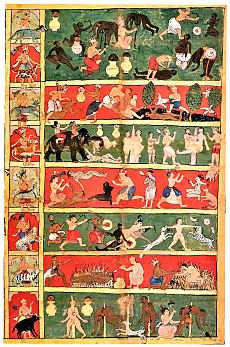 1. Garuda said: What are the torments like that the sinful suffers, having passed along the way of Yama into the abode of Yama? Tell me this, O Keśava.
1. Garuda said: What are the torments like that the sinful suffers, having passed along the way of Yama into the abode of Yama? Tell me this, O Keśava.
2. The Blessed Lord said: Listen, 0 Descendant of Vinatā. I will tell it to you from the beginning to the end. Even at the description of hell you will tremble.
3. Four and forty yojanas, 0 Kāśyapa, beyond the city of Bahubhīti, lies the great city of the King of Justice.
4-5. The sinful man cries when he hears the mingled wails of 'Oh, Oh,' and having heard his cry, those who walk about in the city of Yama. All go to the door-keeper and report it to him. The doorkeeper Dharmadh-waja, always stands there.
6. He, having gone to Chitragupta, 1 reports the good and evil deeds. Then Chitragupta tells it to the King of Justice.
7. The men who are Deniers, 0 Tārkshya, and always delight in great sin; these are all, as is proper, well-known to the King of Justice.
8. Nevertheless, he asks Chitragupta about their sins. Chitragupta, although he is all-knowing, enquires of the Śravanas .
9. The Śravapas are the sons of Brahman who wander in heaven, on earth, and in the nether regions, hear and understand at a distance, and see a long way off.
10. Their wives have a similar nature, and are called, distinctively, Sravanīs. They know accurately all that is done by women.
Atonement for ones sins
Śukadeva Gosvāmī replied: My dear King, if before one's next death whatever impious acts one has performed in this life with his mind, words and body are not counteracted through proper atonement according to the description of the Manu-saḿhitā and other dharma-śāstras, one will certainly enter the hellish planets after death and undergo terrible suffering, as I have previously described to you. (Srimad-Bhagavatam 6.1.7)
Therefore, before one's next death comes, as long as one's body is strong enough, one should quickly adopt the process of atonement according to śāstra; otherwise one's time will be lost, and the reactions of his sins will increase. As an expert physician diagnoses and treats a disease according to its gravity, one should undergo atonement according to the severity of one's sins. (Srimad-Bhagavatam 6.1.8)
The path to Pitri-Loka, the abode of Yamarāja
A day in hell is equal to 100 years of the manusya (mankind). In other words, when humans are in hell, one day is experienced as 100 years.
The path of darkness is called the pitri-yana, or path of the Pitris (the ancestral spirits). According to the Vishnu Purana, to the north of the star Agastya, and south of Ajavithi (the three nakshatras Mula, Purvashadha, and Uttarashadha), outside of the Vaishvanara path, lies the road of the Pitris.
The nakshatras Mula, Purvashadha, and Uttarashadha correspond to parts of the constellations Scorpio and Sagittarius, and it is thought that Agastya corresponds to the southern hemisphere star called Canopus. According to Sridhara Swami's commententary on the Bhagavatam, the path of Vaishvanara corresponds to the nine nakshatras from Mula to Revati (the last three are specifically called Vaishvanara) (Wilson, 1865, p 268).
This puts Pitriloka, or the path to it, south of the ecliptic, starting with the region of Scorpio and Sagittarius. From the latitude of India in the northern hemisphere, the stars on the path of the Pitrs tend to rise only briefly above the horizon, and thus they were also associated with darkness and the underworld.
The entrance to hell at Narakaloka, is surrounded by goblins and ghosts, evil spirits named Yaksas. There are sounds of hundreds of vixens and pitiable cries are everywhere.
See also: PUNISHMENT IN 28 NARAKA HELLS

